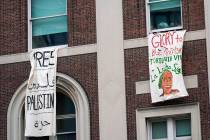Conservative makes case for liberal immigration policies
I've been waiting quite a while for a book like this.
Jason L. Riley, an editorial writer for the Wall Street Journal, recently published a book called "Let Them In: The Case for Open Borders." From a distinctly conservative perspective, Riley deploys in-depth research and free-market principles to explode the talk-show myths about immigration.
From his perch at the world's leading conservative newspaper, Riley picks apart the demagoguery of media rabble-rousers such as Rush Limbaugh, Lou Dobbs and Pat Buchanan, as well as the cynical populism of politicians such as Dennis Hastert and Mike Huckabee.
Riley's heroes, on the immigration issue at least, are Ronald Reagan and George W. Bush, both of whom have understood the vital role that immigrants play in America's economy. They also knew, he notes, that anti-immigrant bluster doesn't translate into votes.
"The immigration issue is the fool's gold of American politics," Riley writes. "Voters like to sound off to pollsters about it, yet they inevitably pull the lever on Election Day with other matters foremost in mind. Elections seldom if ever turn on immigration, and the GOP restrictionist message so adored by talk radio, cable news and the blogosphere once again failed to deliver the goods in 2006."
Riley takes on the popular anti-immigration beliefs one by one, starting with the job-displacement myth. Citing an array of studies, he says immigrant labor does not in fact take jobs away from natives. Rather, it increases the nation's productivity and thus expands job opportunities for natives.
The notion that immigrants drive up welfare caseloads -- the "welfare magnet" argument -- also is debunked. In fact, besides having no negative effect on welfare, immigrants "are net contributors to the federal government's two most expensive entitlement programs -- Medicare and Social Security -- since they tend to arrive in the United States at the start of their optimal working years," according to Riley.
"The real outrage is that baby boomers like Lou Dobbs make a living vilifying these folks to boost ratings, when they should be throwing them a ticker tape parade for helping to keep America's two costliest 'welfare' programs solvent," he says.
The "Peter Pan fallacy" is Riley's next victim. This is the presumption that immigrants never change once they arrive in the United States. In fact, they do change, and for the better. Their economic status rises, their English skills improve and their kids assimilate rapidly.
Multiculturalism, Riley notes, is primarily an academic initiative, not an immigrant desire. In other words, immigrants want to adopt American values, it's the professors who insist on keeping ethnic cultures separate. "Keep the immigrants. Deport the Columbia faculty," Riley writes with a wink.
Riley doesn't let the environmental left off the hook, exposing the falsehoods of overpopulation alarmists. Despite rapid population growth over the past half-century, living standards and environmental conditions have risen across most of the planet.
What's more, the United States is hardly a country that should be worried about its own overpopulation. "America is a very large country, and the vast majority of it remains quite empty," Riley writes. "About 75 percent of the population lives on 3.5 percent of the nation's land. In all, only about 5 percent of America's total land area is even developed."
Anybody who has left Las Vegas on a drive through Nevada must marvel at the vast vacant valleys and wonder why 2 million of us feel compelled to cram into just one of them.
Finally, Riley demolishes the claim that immigrants threaten national security. No credible law enforcement authorities believe Latin American immigrants are terrorism threats. Rather, they note that all the time and money devoted to tracking down Mexican border-crossers draws resources away from the crucial effort to track the Islamic extremists who pose a real threat to national security.
What's primarily behind the anti-immigration movement is not economic worries or overpopulation fears but old-fashioned nativism -- the raw feeling that these newcomers are "inferior" to us and don't embrace "our values." The implication is that if we let them in, they're going to ruin the country.
Nativism has a long history in America, dating basically to the very beginning, as even the revered Benjamin Franklin descended into bouts of xenophobia. Over more than two centuries, nativists have rallied against the influx of Germans, Irish, Italians, Chinese and now Latinos. Amazingly, it was fewer than a hundred years ago that large numbers of Americans, liberals and conservative alike, supported eugenics -- selective breeding to "improve" the human race. Sterilization of the "unfit" and early immigration laws targeted ethnic groups deemed unfavorable to "race betterment."
In hindsight, and in the wake of Nazi atrocities, eugenics seems an outlandish business, yet its traces linger in modern-day nativist sentiments.
The reality, though, is that just as Germans, Irish, Italians and Chinese assimilated and became valuable and celebrated contributors to the American experience, so are Latinos. We are shortsighted to ignore history and to suggest that the Latino migration is any different from the mass arrivals of yore. "A liberal immigration policy has served the country quite well over the past two centuries," Riley writes.
And don't forget: "Let Them In" was written by a dedicated free-market conservative, not a love-in liberal like me. Riley opens his persuasive book with a long quotation from Ronald Reagan, who, despite his many faults, expressed a deep understanding of the immigration dynamic:
"All of the immigrants who came to us brought their own music, literature, customs and ideas. And the marvelous thing, a thing of which we're proud, is they did not have to relinquish these things in order to fit in. In fact, what they brought to America became American. And this diversity has more than enriched us; it has literally shaped us."
Amen, brother.
Geoff Schumacher (gschumacher@ reviewjournal.com) is publisher of Las Vegas CityLife, an alternative newsweekly owned by the same company as the Review-Journal. He also is the author of "Sun, Sin & Suburbia: An Essential History of Modern Las Vegas" and "Howard Hughes: Power, Paranoia & Palace Intrigue." Check out his new blog at www.howardhughesblog.com. His column appears Sunday.























